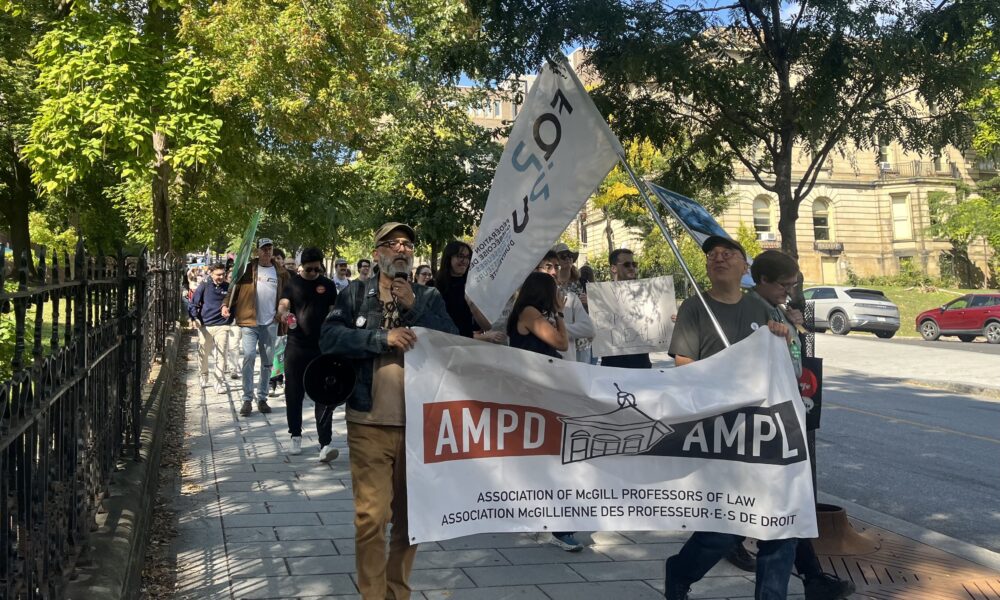This is a developing story.
On Oct. 6, the Association of McGill Professors of Law (AMPL) officially ended its strike, after striking periodically since April. A few days prior, on Oct. 1, the union announced that it would suspend its strike and resume classes for law students effective Oct. 3. The initial suspension was pending an agreement on a federated system for collective agreements (CAs) at the university. This system will allow some policies to be applied university-wide and other aspects of CAs to be negotiated by individual faculty unions.
Under this new framework, AMPL, The Association of McGill Professors of the Faculty of Arts (AMPFA), and the Association of McGill Professors of Education (AMPE) established a “confederation for negotiating university-wide working conditions with the University.” Through this system, AMPL secured McGill’s commitment to halt its judicial review against the union’s certification—a process which had been ongoing since AMPL was certified in November 2022. This agreement was announced in a joint statement from Provost and Executive Vice President (Academic) Christopher Manfredi, AMPL President Evan Fox-Decent, AMPFA Interim President Cathrine Leclerc, and AMPE Interim President Dennis Wendt.
“Following this agreement McGill University undertakes to discontinue its judicial review of AMPL’s certification by the Tribunal administrative du travail by October 8, 2024, as well as its challenges to AMPE and AMPFA as appropriate bargaining units on a Faculty basis,” the statement wrote.
In an interview with The Tribune on Oct. 1, AMPL Vice President (VP) Kirsten Anker highlighted that her union sees this federated system as a step towards securing their CA. Anker explained that part of McGill’s rationale for its de-certification efforts was that it believed that policies should be applied across faculties instead of negotiated with individual faculty unions. Hoping to standardize policies across faculties, AMPL said that the university had been unwilling to give up its unilateral authority to change the terms of AMPL’s CA after it had been signed. Over the course of negotiations, AMPL maintained that McGill’s position had been contradictory to the nature of a contract. According to Anker, this new system represents a compromise that will help both parties move forward. McGill and AMPL will now continue their CA bargaining with an arbitrator.
Despite over a month of delay to the start of the term for Law students, the announcement of the agreement stated that students will complete Law classes on time.
The Law Students Association (LSA) organized a rally in solidarity with AMPL on Oct. 2. Carina Cutillo, 1L, attended the event and told The Tribune that she believes the strike has strengthened bonds between students and professors.
“I think the students have come together in a lot of ways, and I think that hopefully we come out of this with an even stronger alliance between the students and the profs, and can make this year even better than previous years because of that,” Cutillo said
The rally hosted representatives from unions across campus who called on the university to bargain in good faith.
“McGill’s realized the ship of having no faculty unions has sailed,” McGill University Non-Academic Certified Association VP Communications, James Newman, told the crowd. “This is a union campus!”
In a speech to the crowd, Fox-Decent expressed his appreciation for the support that students and other unions have shown to AMPL during its strike.
“The best things we do in life, we seldom do for money, and the best things we do in life, we never do alone,” Fox-Decent said. “And that could not be more true of what we have done over the past several months.”
Anker underlined that McGill’s strength comes from the collective contributions of its staff and students.
“To students: Thank you for your solidarity. I hope we can show up for each other in the future, because this is our community [….] We are McGill. McGill is nothing without its professors. It’s nothing without its support staff. It’s nothing without its students [….] We should think of ourselves as in this together.”







